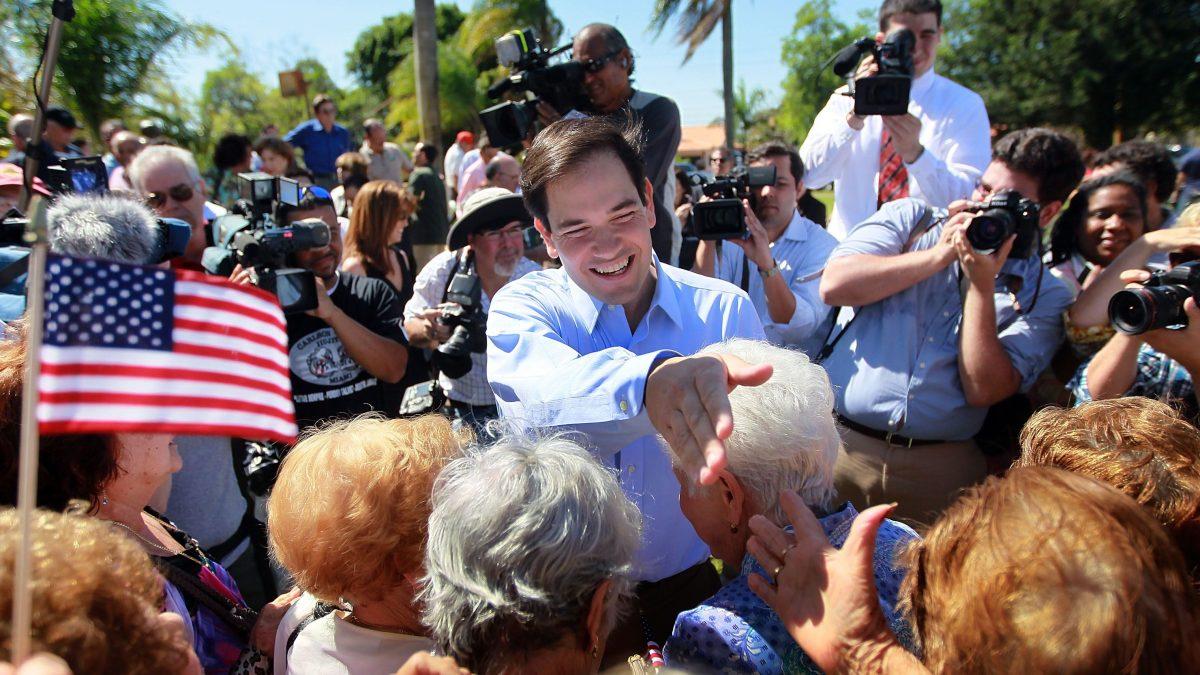Trump (face-palm). Carson. Fiorina. These three outsider candidates stole the limelight during the first two debates—with much entertainment value—and surged to the front of the polls. This time, however, the third time was not the charm. Instead, the true star of the third GOP debate was none other than Florida’s 44-year-old junior senator, Marco Rubio.
True, the media descended upon CNBC’s ill-prepared moderators and magnified Senator Cruz’s rebuke of said moderators. Fiorina had the most airtime, more than 22 seconds over Rubio, and initial post-debate polls still showed Trump and Carson in the lead. But the true breakthrough winner was Marco Rubio – thanks to his solid, constructive and memorable responses. He took down Governor Bush’s jab at his Senate attendance, not only neutralizing the attacks on his missed votes and expressed dissatisfaction with the job, but also damaging Bush’s own performance and presenting himself as the young, prepared Floridian of choice.
Rubio also firmly defended his tax plan’s capability to benefit the lowest 10 percent of income earners more than it would the top one percent. Based on Tax Foundation’s analysis, Rubio’s tax plan would allow after-tax incomes to rise for the lowest income earners by 55.9 percent, with economic growth taken into account, compared to 27.9 percent for those at the top. The moderator, John Harwood, had this fact completely wrong on air and later corrected on Twitter his incorrect portrayal of Rubio’s tax plan. Rubio bolstered his explanation with other points such as his low tax rate for small businesses, no-tax policy on investments and a child-tax credit for working families. Rubio further shined by emphasizing his proposals for more vocational education and stronger oversight over granting H1B non-immigrant working visas when questioned about H1B and its impact on domestic employment. To cap things off, he clarified his position to modernize Social Security without cutting benefits – a message that resonated well with both the generation currently dependent on it and future generations fearful of its disintegration. Add on his radiating youthful vigor and professional demeanor, the Senator was clearly – as one distraught Jeb donor noted – the ‘Jedi Master’ of the Boulder Debate.
But where does Rubio go from here? What happens? Wednesday’s success has translated, so far, into constructive gains for Rubio’s campaign. Within 72 hours of the Boulder debate, Rubio’s team received more than one million dollars in donations to boost his efforts. He has also surpassed Governor Bush in the polls, and depending on which poll one looks at, is at third place or roughly tied with Senator Cruz. All this positive fallout has given Rubio much-desired tail-wind – but it also exposes new challenges.
Now that Rubio has broken away from the indistinguishable GOP ‘pack’ and joined the forerunner’s group, he now has to adjust to more media magnification and barbs launched by other candidates. He also has to continue to hold his ground against the still-leading Trump and Carson, who are leading in the Iowa polls. Having more stellar debate nights will help – but crafting a long-term strategy that builds upon Rubio’s current momentum will be most important. This strategy will revolve around promoting his personal strengths, such as his foreign policy expertise, innovative economic proposals and unique solutions for K-12 and higher education reform. This strategy will also include promoting his relatable background to the America’s ever-diversifying voting population — Rubio is the son of first-generation working-class immigrants, a college debt-holder and a mortgagor. These components are essential to helping him succeed in the 2016 primaries and getting into striking distance for the nomination.
Equally important are the long-term benefits derived by the GOP from Rubio’s positive post-debate public reception. Specifically, for the growing group of young, diverse, neoconservative Millennials – a sector of the constituency that the media hardly pays attention to — Senator Rubio’s breakthrough showing was a reaffirmation to us that the new face of the GOP is finally getting the limelight. It was also a confirmation that the GOP has the ability and the will to be the party of the future, led by leaders who have viable proposals, a contemporary outlook and a clear vision to address our domestic economy, foreign policy, higher education and other pressing issues. I speak for many young Conservatives when I say that we are tired of seeing impractical party hardliners and purely raucous candidates in the spotlight and disrupting the 21st century conservative movement’s evolution and progress. It’s time to stop being excessively divisive (as Speaker Paul Ryan noted), recognize and act upon areas needing improvement and use the wide variety of conservative viewpoints and ideas to form policies that are appropriate, constructive and with foresight for the American people.
As Senator Rubio fittingly puts it, yesterday is over. America needs more statesmen and stateswomen – at both the legislative and executive level with a 21st century awareness and the capability to implement policies that will truly improve our standard of living and overall global competitiveness. We do not need anymore the inheritors of political dynasties or pure reactionary figures. Thankfully, Senator Marco Rubio is a candidate ready to take America forward with working conservative strategies – and the GOP is finally paying him with its due attention.
Photo courtesy of Fox News




